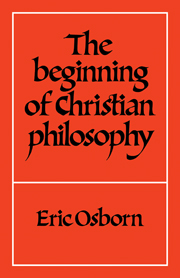Book contents
- Frontmatter
- Contents
- PREFACE
- REFERENCES
- ABBREVIATIONS
- 1 CHRISTIAN ARGUMENT
- 2 PEOPLE AND PLACES
- 3 THE GOD ABOVE
- 4 THE RATIONAL LAUGHING ANIMAL
- 5 COSMOS AND CREATION
- 6 HISTORY
- 7 THE SHORT WORD
- CONCLUSION
- APPENDIX
- BIBLIOGRAPHY
- INDEX OF BIBLICAL CITATIONS
- INDEX OF CITATIONS FROM ANCIENT AUTHORS
- INDEX OF CITATIONS FROM MODERN AUTHORS
- GENERAL INDEX
- Frontmatter
- Contents
- PREFACE
- REFERENCES
- ABBREVIATIONS
- 1 CHRISTIAN ARGUMENT
- 2 PEOPLE AND PLACES
- 3 THE GOD ABOVE
- 4 THE RATIONAL LAUGHING ANIMAL
- 5 COSMOS AND CREATION
- 6 HISTORY
- 7 THE SHORT WORD
- CONCLUSION
- APPENDIX
- BIBLIOGRAPHY
- INDEX OF BIBLICAL CITATIONS
- INDEX OF CITATIONS FROM ANCIENT AUTHORS
- INDEX OF CITATIONS FROM MODERN AUTHORS
- GENERAL INDEX
Summary
‘History is bunk.’ The question of the continuity of past events was important for the first Christians. Yet for some, like the Gnostics, it was trivial; for others, like Marcion, it was bad, not merely bunk but bad bunk. For the Gnostics, the most it could provide was a reflection of the divine reality, for nothing really happened outside God. For Marcion, the past told of another God, and whatever it said was wrong. Yet Justin, and those who came after him, loved the story of the past, they loved talking about it, and making sense of it. They were, indeed, too keen about it for most of their readers today. Justin fills page after page with too many references to the Old Testament, with the way in which it makes sense of Jesus and Jesus makes sense of it.
With the apologists, this interest in history begins, like everything else, as a response to a challenge, a rebuttal of an objection. What right had Christians to make such extraordinary claims for their knowledge of God? If they had the truth, did they think that nothing true had ever been said before? They used the Jewish scriptures, but they did not keep the Law of the God who had spoken in them. Marcion and the Gnostics were at least consistent: they did not pretend that the most high God or the divine Pleroma had anything to do with the Old Testament.
- Type
- Chapter
- Information
- The Beginning of Christian Philosophy , pp. 163 - 205Publisher: Cambridge University PressPrint publication year: 1981



